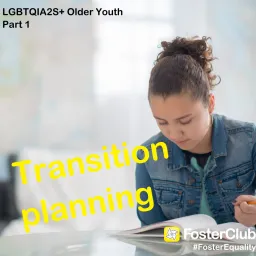LGBTQIA2S+ youth in foster care are more likely to age out of the foster care system than their heterosexual peers. Youth aging out of the system deserve to have help during this huge transition in their lives.
“When we are in foster care, all of our major basic needs are met almost automatically. Our healthcare-related needs are generally met without our consultation or guidance. Same goes for our academic and basic needs. The problem is that we are not prepared to have to complete these tasks for ourselves.”
--former foster youth in New Jersey
What have youth stated is the most effective way to prepare a LGBTQIA2S+ young person for success as they transition to adulthood?
In 2020, the National Foster Youth & Alumni Policy Council surveyed former foster youth across the country to gather their thoughts on how to best support foster youth if they age out of the system. One of their resulting priorities centered on transition plans and resources that should be available for youth who age out. Below is the first half of the priority, with added context for LGBTQIA2S+ youth in care:
- “Ensure youth have access to vital documentation, such as birth certificates, and social security cards.”
- This is important for all older youth in care. For queer youth in care, child welfare professionals and caregivers should make sure that such documentation reflects the young person’s preferred name and gender. For information on how to do so in your state, visit this resource from the National Center for Transgender Equality.
- While there is an existing requirement that youth receive these vital documents when they leave care, the Family First Prevention Services Act (2018) also requires states to provide official documentation that proves the youth was previously in foster care. This documentation helps establish the youth’s eligibility for certain programs and services.
- “Transition Planning meetings should be held at least once every three months, starting no later than two years prior to emancipation, and monthly during the year prior to exiting care.”
- The Family First Prevention Services Act requires state agencies to start transition planning when youth are 14.
- FosterClub recommends foster youth do 21 things before they transition out of care to make sure they have a successful journey to independence. Read FosterClub's "It's T Time" to become familiar with steps foster youth should take before they leave foster care. FosterClub also has a Transition Toolkit to help foster youth plan for their transition into adulthood
- LGBTQIA2S+ youth should always be involved in their transition planning process in order to accommodate their specific needs.
“Being involved in the planning and decision making process well before you transition out will help give you a say in what you want to do with your independence…. Don’t put off your future; take advantage of the support and resources before you leave care. “
--former foster youth from Utah
- “Educate policymakers on how foster youth benefit from programs and services that support a successful transition to adulthood.”
- The John H. Chafee Foster Care for Successful Transition to Adulthood Program (the Chafee Program) aims to increase successful transitions to adulthood. It permits states to provide services to youth who have aged out of foster care up to the age of 23, and allows five (5) years of eligibility for Education and Training Vouchers (ETVs) up to age 26. Every foster youth has the right to access this program, regardless of their SOGI.
- The Family First Prevention Services Act also supports services for youth who age out of the system, starting at age 14. See Part 2 and Part 3 of this series about how this Act matters to LGBTQIA2S+ youth in care!
For more information on how to support older LGBTQIA2S+ youth in foster care, visit the other parts of this series!
- Part 2: Supporting Older LGBTQIA2S+ in Foster Care
- Part 3: Policy Corner: Understanding Family First Act's Impact on LGBTQIA2S+ Older Youth in Foster Care
- Part 4: Practice Improvement: Supporting Transition Planning
Here are some additional resources for professionals and caregivers for queer foster youth:

